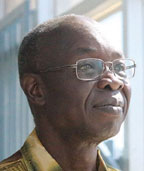
 San Diego’s refugee community mourns the tragic loss of Alfred Olango
San Diego’s refugee community mourns the tragic loss of Alfred Olango
Walter Lam, the president of The Alliance for African Assistance and a refugee himself, remembered welcoming Alfred Olango and his family to the area through his organization. (Chida Warren-Darby/San Diego Voice and Viewpoint)
By Chida Warren–Darby (The San Diego Voice and Viewpoint, NNPA Member)
On Tuesday, Sept. 27, 38-year-old Alfred Olango was gunned down in El Cajon, Calif., after officers received a call for assistance from a woman who needed help with her brother, who suffered from mental illness.
Olango’s shooting death marks the 217th incident in which police have killed a Black person in the United States this year.
A refugee from Uganda, Olango came to the states with his family, when he was a child. Walter Lam, president of The Alliance for African Assistance and a refugee himself, remembered welcoming Olango and his family to the area through his organization, and shared what their transition into American culture represented.
“Coming to this country, all of us are fleeing from brutality,” he said. In his country, and other war-torn African countries, the desire to leave home and get to America represents a promise of a better life. “Coming to America, the biggest shock for us is to see that what we ran away from [has followed] us here. This [violence] is coming from people that should be protecting us.”
Lam explained that, for Olango and his family, in their Ugandan neighborhoods, and everywhere surrounding them, there was war.
“[Olango’s] family escaped from there and made it into Kenya, and from Kenya came to San Diego,” said Lam. “Even though their home countries are traumatizing, many refugees upon arriving here seeking relief, are left with intensified feelings of unrest.”
Lam continued: “To come here and be killed by police, in a situation where we believe this young man should not have been killed is what is so traumatizing.”
Lam said that, looking at the scenario, you can clearly see Olango’s sister was calling for help, “and the help delayed coming and considered that [the call] wasn’t life threatening,” but if it wasn’t life threatening, then why is Olango dead? Lam said that he knows for sure there was a mental health problem there, “but it wasn’t a mental issue that would lead to someone being killed. He had a sister crying out, the message was, ‘I called you to help my brother, and now you kill him?’”
Hundreds of people gathered in El Cajon in the hours following the incident, protesting and demanding answers. Mara Elliott, the Chief Deputy City Attorney said, “As we’ve seen in other communities, San Diego is now searching for answers to the tragedy in El Cajon. Our communities are struggling to understand the events that led to Alfred Olango’s death. I have full faith that our law enforcement agencies will investigate this tragedy fully and as swiftly as possible. I also believe that this tragic shooting underscores the importance of building trust between police and the comm-nity. We need greater under-standing on both sides.”
Lam agreed that trust needs to be built and soon.
“We stress to refugees to be law abiding. If you’re stopped by the police, don’t even move. Sit if you’re in the car, wait for instruction,” said Lam. “Every-thing they’re saying you need to follow, because the judgment on us is a little rougher. There’s this preconceived idea that we are violent,” which doesn’t seem like its being erased.
In Uganda, those in uniform are feared. “We don’t even want to come across them,” he said. “Some refugees coming here that see a mailman delivering mail are scared. The uniform reminds them of what they ran away from.”
Lam believes if officers were trained more on cultural sensitivity that great strides could be made at preserving lives.
Staff members at Lam’s Alliance are equipped with cultural knowledge to make sure they can meet the needs of every person they encounter.
“I tell schools, if you have a new computer out there, you are given instructions on how to use it. How about children coming to your school? Give us an opportunity to come and educate you on where they’re coming from, what they’re going through and what has forced them to come here,” Lam urged. “This is including law enforcement people.”
In San Diego, organizations that are prominent in the Black community are responding to the shooting death of Olango.
The San Diego Urban League released a statement that said: “Law enforcement, elected officials and local leaders must come together to address with the community the issue that has led to this death and take the necessary steps to ensure no other family 0ever faces the loss of a son, father or brother at the hands of law enforcement. The pattern of shootings by police officers of unarmed Black males is alarming to the Black community and raises questions regarding police officers’ training and racial bias.”
The group also requested that the El Cajon Police Department fully disclose the circumstances of the Olango shooting to the community.
The statement continued: “The Police Department must act expediently to meet with the black community, governmental officials and local leaders. The integrity of the El Cajon Police Department is at stake. Police Chief Jeff Davis must take building the Black community’s trust very seriously.”





Be the first to comment